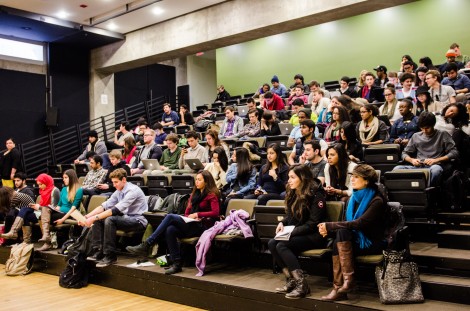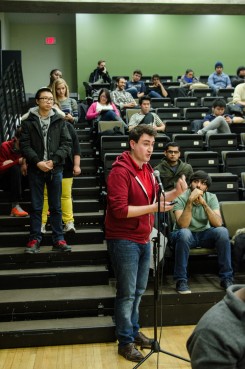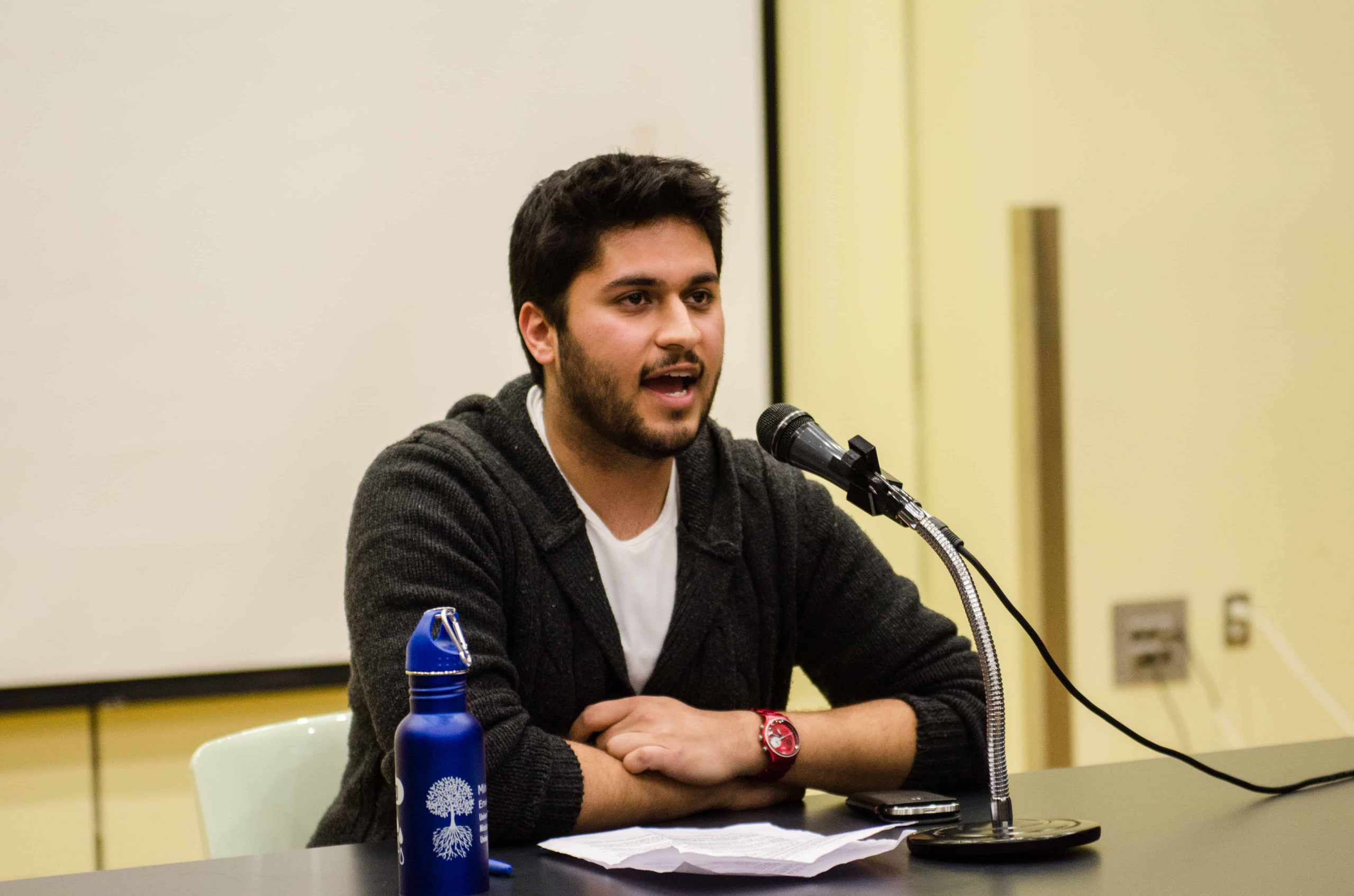Polls open Tuesday in this year’s UTSU election, marking the end of an uneventful and low-key campaign period. Team Renew, led by current vice-president, university affairs Munib Sajjad, is unopposed in its pursuit of all available executive positions.
The contested races are for positions on the union’s Board of Directors.
Renew has been on the campaign trail for much of the last week, making class announcements, postering, and speaking to students on both the St. George and Mississauga campuses, says Sajjad.
“It has been a clean election so far,” said Eric Luong, chief returning officer (cro).
There have been two election complaints to date, both from candidates for the board of directors who failed to meet the required number of signatures to run.
Both complaints were dismissed by the Elections and Referenda Committee (erc).

BERNARDA GOSPIC/THE VARSITY
Avoiding the Question
Sajjad has remained relentlessly on-message throughout the week, declining to provide specifics on how he intends to respond to the upcoming referenda on fee diversion.
Instead, Sajjad has repeatedly called for unity amongst all factions of the student body, stressing that the union can accomplish more with its 47,000 members working together.
Both incoming and outgoing UTSU presidents have also said any referenda on the union’s membership must be voted on by the entirety of the student body, not only by those units seeking to sever financial ties.
“There is too much hesitation based on old divisions to work together for a common purpose,” said Sajjad “We must all put aside our old hatreds.”
Student leaders from St. Michael’s, Trinity, Victoria and the Engineering Society have scheduled March referenda on whether to divert fees away from the UTSU. The units feel their members will be best served by local college councils instead of a centralized union.
“Frankly, right now, the most important thing the UTSU could be doing is providing a referendum on fee diversion,” said Trinity College co-head Sam Greene. The elections are “essentially a propaganda exercise for the incumbents,” says Greene.
The UTSU has denied the college’s requests to hold unit-specific referenda, forcing the units themselves to host the votes themselves.
Sajjad has said that he intends to meet with college leaders, as well as students in colleges contemplating severing financial ties, in order to convince them of the benefits of continued UTSU membership.
During the campaign, Sajjad has studiously avoided questions about whether he would be willing to seek a change in the union’s bylaws to allow for a referendum. He has also declined to answer whether he will lead a “no” campaign that would urge students to retain financial ties with the union.
Most pressingly, Sajjad has refused to say whether he will pursue legal action if the colleges and university administrators approve fee diversion.
For Greene, this is deeply concerning. “His members have a right to know before they vote yes whether his intention is to embroil the union in a legal battle,” he says.
All-Candidates Debate

BERNARDA GOSPIC/THE VARSITY
The five unopposed executive candidates from the Renew slate participated in a subdued all-candidates debate Wednesday. The candidates emphasized the common themes that have shaped Renew’s campaign, including investigating and exposing illegal ancillary fees, improving the status of international students, and involving more people with the work of the union.
Sajjad, the presidential candidate for Renew, spoke passionately about the power of a united student body: “Across the world, we have seen students at the forefront of change. From toppling governments to bringing changes that affect students as a whole, students have been starting the conversation, leading the research and sparking mobilization everywhere,” he said. “This is the strength of the student movement.”
In a heated moment, Trinity College co-head Sam Greene noisily exited the debate after Sajjad declined to state whether he would consider legal action in a hypothetical scenario in which several divisions had voted and been approved to have their fees diverted.
“If a referendum were to be held at the UTSU, it is for all members to participate in, not specifically for one college or one small group,” said Sajjad.
Outgoing president Shaun Shepherd made a similar statement at a VUSAC meeting about fee diversion.
Sajjad did not address whether he would pursue legal action, instead saying that he hoped to meet with opposition leaders to discuss their concerns. Sajjad called for continued dialogue, as did several Renew vice-presidential candidates. Sajjad also said he believes that most students do not know what the union actually does, and argued that if they did, they would likely be more supportive. He said too much time has been spent this year with “quarreling over minor and petty issues.”
The remainder of the two-hour debate was uneventful, with each vice-presidential candidate explaining their priorities for the upcoming year.
Vice-president, university affairs candidate Agnes So was unable to attend for personal reasons.
In a statement read by Sajjad on her behalf, So said her goals include opposing illegal ancillary fees and flat fees. So also proposed instituting a drop credit policy that would let students select their lowest mark to exclude from cgpa calculations.
Yolen Bollo-Kamara, the candidate for vice-president, equity, focused on combating the “misogyny and sexism” of ‘men’s issues’ groups on campus, and continued support for the embattled Transitional Year Program.
Cameron Wathey, the candidate for vice-president, internal & services, said he plans to re-design the union’s website and expand the union’s photocopying services.
Vice-president, external candidate Sana Ali said she plans to maintain good relations with Queen’s Park, while lobbying to expand the eligibility criteria for the provincial government’s 30% off tuition grant.
Similar Platforms
Renew’s platform echoes those of previous slates. Last year, Munib Sajjad and Yolen Bollo-Kamara were part of the executive team that promised to fight flat fees, negotiate discounted gta public transit for students, and lobby for expanded health coverage for international students. Many of this year’s campaign proposals are extensions of last year’s, not all of which has yet been accomplished.
There are some new proposals, including an opt-in program for St. George students who wish to ride the utm shuttle bus to Mississauga, and ensuring U of T students are consulted in the hiring of the new U of T vice-president and provost.
Polls will be open Tuesday through Thursday.


